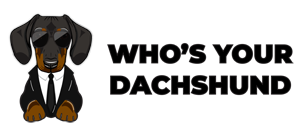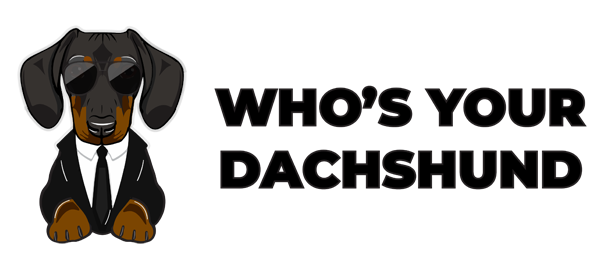
Dachshunds are famous for their ability to hunt rabbits, and the rabbit is the Dachshund’s natural prey. This trait was passed on to them from their ancestors, the Beagle and the Dachs Hound. Dachshunds were bred to hunt rabbits, not in packs like Beagles are, but for their keen sense of smell. They are fearless animals that are incredibly loyal and protective of their owners. They were bred to chase a rabbit’s scent underground and then dig through the earth to retrieve it; this is why they have such short legs and long bodies because it gives them more leverage when going underground.
How does a Dachshund hunt for rabbits?
1. They run around, nose to the ground while sniffing for a rabbit’s scent.
2. Once they catch a scent, they will start digging in that specific area.
3. If you do not interfere and let the Dachshund complete the hunt independently, he should have killed or captured the rabbit by the time he finishes his digging and comes to the surface.
4. Now, you need to take your prize outside and handle the situation accordingly.
What can you do if the rabbit escapes?
1. If the rabbit happens to escape your Dachshund’s grasp while he is underground after chasing him down there, then you need to go in after him. You will know that he needs assistance when he lets out a scream and starts digging back towards the surface.
2. The second thing you need to keep an eye out for is a sort of “dive-bombing” technique that involves your Dachshund “bombing” through the ground after a rabbit.
3. The last thing you need to keep an eye out for is a “dig-in” technique. This involves your Dachshund digging in, then the rabbit jumping out of the hole and running away. At that point, your Dachshund will chase it down and kill or capture it.
Dachshunds are fearless and highly loyal animals to their owners, so as long as you train them properly, they should not do any harm to you or anyone else if they feel threatened. Once you have trained them on hunting a rabbit, there are no other dangers except for the occasional bug or poisonous snake that accidentally falls into the hole they dig while looking after their hunting exploits.
Dachshund Hunting Dogs
Dachshunds were made for hunting. They have short legs which can fit in places that other dogs can’t, and they have a long body that is perfect for chasing prey. They are also great as watchdogs because they have a strong sense of smell and hearing and are pretty aggressive to those who enter their territory.
If you want a dog that will keep your family safe and hunt with his life, then the Dachshund is the best dog for you. They were initially bred for hunting rabbits in Germany, but Americans picked up on the idea and began using them for hunting even more so than their German ancestors.
History of the Dachshund as a Hunting Dog
The Dachshund first became a hunting breed in the 16th century. These dog breeds are believed to have been introduced to Germany from Bohemia, where boar hunters used them. The breed’s name comes from their short legs, which allowed them to chase the boar into holes in the ground, where they would then dig for it.
It’s important to understand that there are two types of Dachshunds, one that is a traditional German (also known as long-haired) and one that is what Americans call “docked.” The docks are a type of Dachshund that has had its tail docked. It was due to a preference to hunt rabbits well and a desire to live a comfortable life. Most people think the long-haired Dachshund is what you want because of their appearance, but they have no real advantage when hunting.
Traits of the Dachshund as a Hunting Dog
Versatile Hunting Ability.
The Dachshund has a unique shape that makes them so great at hunting. Their long body allows them to chase rabbits down their holes and dig for them, whereas shorter-bodied dogs couldn’t do this.
Sharp Nosed and Ears
Dachshunds have a very keen sense of smell, which allows them to sniff out burrows and dig after prey. Their ears are very sharp and can pick up the faintest sounds, which is also helpful when hunting for prey underground due to their sensitivity in the area of sound.
Determination and Passion for Hunting
Dachshunds are very determined when it comes to hunting. They don’t give up until they have either killed their prey or captured it, which can be very beneficial if you’re trying to get a specific type of animal. Dachshunds also really love to hunt, so once they catch the scent of something, they don’t stop until they find it. It makes them better hunters than other dogs because you have to tell them when to quit and come back home with you.
Very Affectionate
Despite their small size, Dachshunds are pretty affectionate towards their owners and children. They like being around people and love being with their families. Dachshunds have a strong sense of loyalty to their owners and will always protect them, even if that means risking their lives. They also really enjoy being rewarded when they do something right and will be incredibly grateful for the act.
Good with other Dogs
If you have a Dachshund, there’s a good chance he’ll have a friend or two among the neighborhood dogs. They love being around other animals so much that they’ll even date them sometimes! Because of this, Dachshunds make good pets for families with dogs, but they shouldn’t be left alone with another dog unless you’ve trained both of them on how to coexist peacefully together.
Advantages to Owning a Dachshund as a Hunting Dog
- High Energy Level
Dachshunds have a very high energy level, so they’ll want to run and play for hours on end. That is something you’ll need to make sure you can handle with your Dachshund, or they may start developing bad habits. You must keep them busy both indoors and outdoors, even if it means leaving them home alone until they’re old enough to be comfortable in your absence.
- Small Size
Dachshunds are a medium-sized dog that only weighs around 10-15 pounds when they’re fully grown (or even less if it’s a miniature Dachshund). It makes them suitable for traveling around when you’re camping, hiking, or just going on a long walk. They also fit in small spaces without having to be curled up like a cat, so they’re great for apartment life.
- No Shedding
Dachshunds are among the few breeds that don’t shed at all. They can easily be kept inside because they don’t need to go outside very often to do their business. Although Dachshunds will occasionally bark if someone comes through the front door, this is usually because of their fear of strangers and not an actual need to establish territory or get another dog’s attention. If they want your attention, they’ll come to get it!
- Affectionate
Dachshunds are known for being very affectionate, loving dogs that love to cuddle with their owners at the end of a long day. They’re known for their “Velcro-like” attitude, and most Dachshund owners will tell you that their Dachshund looks up to them as the leader of the pack.
- Intelligent
Dachshunds are among the most smart dog, making them easy to train at home or in dog training classes. They do best when they’re given instructions one or two steps at a time but master new tricks quickly when they’ve been broken down enough to understand how it works.
Disadvantages to Owning a Dachshund as a Hunting Dog
- Prone to Back Problems
Dachshunds are prone to disc disease, which is why it’s so crucial that you watch your Dachshund’s weight and don’t let them get too out of shape. If your Dachshund becomes overweight or obese, this can cause hind legs and back problems for them.
- Noisy Barkers
Dachshunds are known for their ability to bark quite loudly (and often). They’re not the best choice for anyone who lives in a quiet neighborhood and would like a dog that won’t be too annoying or fit in with the community.
- Life Expectancy
If you get a Dachshund puppy, their average life expectancy is 12-16 years. That’s a long time for one of these little guys to be around, and it shows just how much faith they have in you and your abilities as their owner. However, if your Dachshund becomes overweight or obese, they’re likely to develop disc disease, which can reduce their life expectancy considerably.
- Expense
While Dachshunds are generally pretty cheap when it comes to the cost of maintaining them, they can be expensive when it comes to buying proper food and toys for them. They also need to get their ears checked and cleaned every three months to prevent infections, which can be an extra expense.
- Prone to Certain Health Problems
Dachshunds are prone to specific health problems, including cancer, eye problems, disc disease (Dachshunds are more susceptible), and hip dysplasia. Many of these problems are treatable if caught early, so it’s essential to keep your Dachshund around for a long time and see your veterinarian regularly.
How to Train a Dachshund to Hunt
Positive reinforcement (positive punishment) is the most effective way to train a Dachshund to hunt, which is what you’ll need if you want it to become a family pet.
- Positive Reinforcing
To train your Dachshund, you’re going to have to associate positive things with the things they love. For dogs, the essential thing in life is food. If you want your Dachshund to do something for you, reward them with a treat as soon as they’ve done it. Only do this if the dog is doing something right, and never give them a treat for doing something wrong.
- Talk to Them While They Hunt
When your Dachshund goes out hunting for prey, talk to them in a soothing voice and tell them what a good job they’re doing. If your Dachshund doesn’t come back with any prey, don’t reward it or yell at it – this will make it harder for it to work in the yard, and they’ll stop hunting entirely!
- Supervise Your Dachshund
Most of the time, your Dachshund is going to be doing one of two things: digging for a prey item or running around loose in the yard if you’re home. It means that you need to put yourself where your Dachshund sees you as most often as possible. If you can train your dog to stay by your side for long periods while you’re home, this will help encourage them to come back when they run out of things to hunt.
- Play Games with Them
It is another strategy that will help your Dachshund to get used to playing in your yard. When playing these games, you play hard-core games with them, like tug-o-war, hide-and-seek, etc. That will encourage them to come back when they need more exercise and excitement and make you seem like a fun person to be around!
- Find Some Books on Training Your Dog
If you already have a Dachshund and you’ve started training it without knowing how to train a Dachshund, you need to go out right now and find yourself a book on how to train your dog. Countless excellent resources will turn your wild beast into the perfect companion, and it’s up to you as the owner to ensure they are adequately trained. Since it’s so easy for these dogs to learn or unlearn bad habits, this is vital for anyone who wants their Dachshund’s obedience skills to be top-notch.

